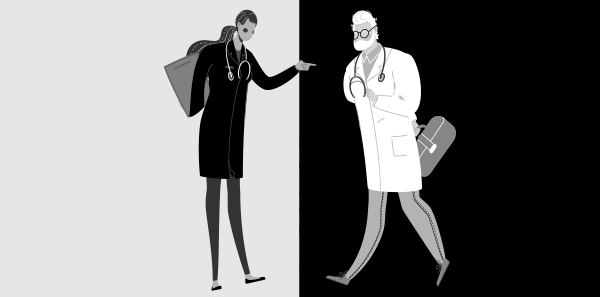
Consequences of Unfair Testimony
Physicians who knowingly provide exaggerated or unfair testimony may think of this as a “victimless crime,” but this severely underestimates the impact on physician defendants’ stress, which has directly led to suicide in some known cases.3 More often, as indicated in the ACEP survey, it adds to litigation stress in its entirety, which can have severe repercussions on the defendant. It also fuels unwarranted litigation and increases insurance and litigation costs.
Explore This Issue
ACEP Now: Vol 39 – No 04 – April 2020Even well-meaning physicians can unknowingly do damage as experts by not understanding the concept of “standard of care.” We are inclined to judge one another’s work harshly when it falls short of perfection, and we all strive for perfection ourselves, but “standard of care” is not perfect care. Standard of care is “minimally competent care”—what a minimally competent physician might do in a similar environment, with similar resources, faced with a similar case.4
Another concern that remains unaddressed is that there is no requirement for academic physicians to declare conflicts of interest when they have earned income as experts on a given topic. This is disconcerting, as highly paid experts who regularly testify on one side of a given topic have a very strong incentive to give presentations and continue publishing articles that support that opinion. When they speak at conferences or take to social media espousing these views, it advertises to attorneys searching for experts on that topic. In turn, attorneys point to those appearances and publications to bolster the expert’s perceived credibility and “unbiased opinion” as an expert in court.
How to Be a Good Expert Witness
Experts should familiarize themselves with and staunchly adhere to ACEP’s expert witness guidelines.2 However, I have my own common-sense suggestions for your consideration.
- Don’t do expert work at all if you have to overstate or misrepresent your credentials or expertise.
- Don’t do expert work if you have stopped working clinically or if you are in training or only a few years into practice.
- Don’t testify about matters you don’t have extensive personal experience with or if you have never regularly practiced in a similar setting.
- Don’t testify in cases regarding specialties in which you are not board-certified.
- Don’t let attorneys choose your words or skew your language to benefit one side. Do not overstate your opinion. Do not deliberately omit information.
- Your income from expert work should not exceed 30 percent of your clinical income in any given year.
- Don’t equate a bad outcome with malpractice.
- Be mindful of hindsight bias. If you think you likely would have done the same things as that defendant, say so.
- Your role is not to persuade anyone; it is to interpret the facts and state whether the standard of minimum competence was met.
- Take the time required to fully understand the case. Do not equate bad charting with malpractice, even if it means digging for information. If you subsequently learn additional information, reserve the right to change your opinion.
- Finally, testify unto others as you would have them testify unto you—honestly, objectively, dispassionately, and with a clear understanding of the medical facts, as well as the defendant’s practice environment and the legal definition of standard of care.
Pages: 1 2 3 | Single Page



No Responses to “Who’s to Blame for Unfair Litigation?”